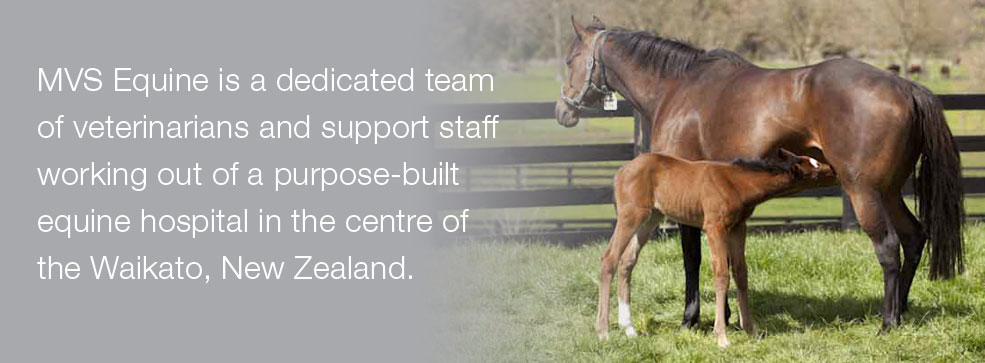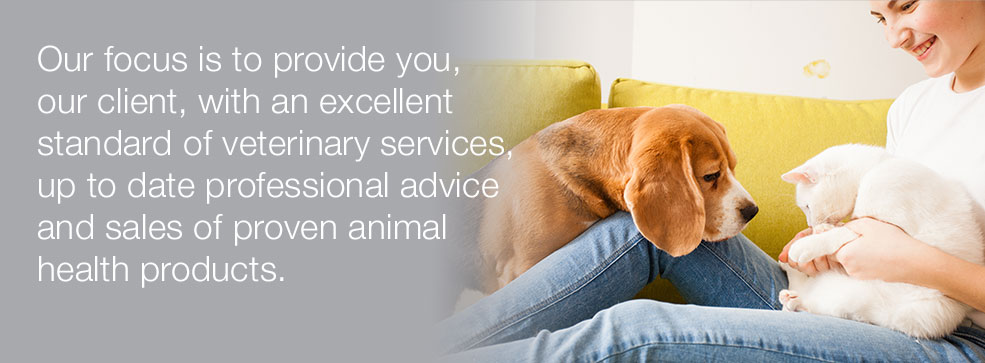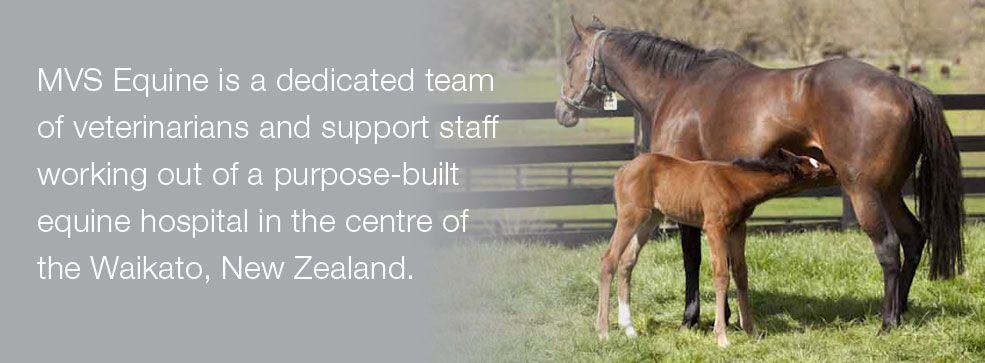Farewell TB
Farewell TB
October 14, 2024
Something in the water at the MVS Small Animal Clinic?
The time has come again for us to farewell Vet Nurse Toni as she heads off to welcome a second little one to the family. Toni and Chris are incredibly excited to be adding to their family and we are sure Amelia is going to make the best big sister. We wish them all the best and can’t wait for some newborn cuddles soon.

Mycoplasma Haemofelis
September 9, 2024
Albie was presented to MVS Small Animals as he wasn’t eating as many biscuits as normal, wasn’t hunting like usual and was sleeping a lot. When we examined him, we found he had lost weight, had pale gums, and had an increased heart and breathing rate.
We decided that we needed more information to try and pinpoint exactly what was going on with Albie. This uncovered that he was anaemic (had less red blood cells than normal) and had a blood parasite called Mycoplasma Haemofelis. This parasite attaches to the red blood cells and the body destroys the cells as it fights the infection.
Albie was a very sick cat but once we knew what was wrong with him we could start treatment. He was started on a long course of the antibiotic Doxycycline to directly kill the parasite, and the steroid prednisolone to stop the body from attacking its own red blood cells. Albie was given intravenous fluid therapy, and was syringe fed by both the MVS nurses, and then his committed parents over the next 2 weeks as he slowly recovered.
Mycoplasma Haemofelis is thought to be spread by fleas, mosquitos or ticks, or can be spread by infected cats fighting and biting each other. So, the best thing you can do to try and prevent Mycoplasma infection is to be vigilant with flea treatment and try and prevent cat fights.
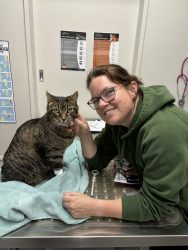
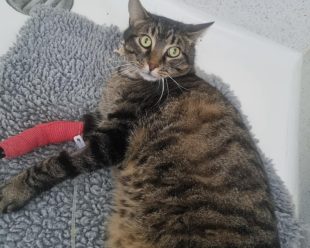
Unusual skin condition – in the words of Baz Lurhmann ‘wear sunscreen’
July 22, 2024
Handsome man Mac came to us for a second opinion for a non-healing sore nose. Dr Charlie took some samples to look at in house and started him on a course of antibiotics to see how well he responded and also prepare him for biopsies of the nose to be taken under general anaesthetic.
With the help of our wonderful SVS laboratory pathologists and some extra help from dermatologists overseas, a working diagnosis of Discoid Lupus Erythematosus was made. This condition is caused by the body attacking its own cells (immune mediated) and exposure to sunlight is thought to be a possible trigger. Most commonly it effects middle aged long-nose breeds such as Collies, German Shepherds and Huskies; and can affect a few different areas including the nose, eyes and lips. With the nose in particular the main clinical signs are changes in pigment colour, scaling and ulceration which can be quite painful.
Fortunately for Mac his owners were very keen to try the best treatment options for him and he was started on a topical immune modulating cream as well as daily pet sunscreen.
One month after treatment Mac is showing a vast improvement and although it may take a long time for the colour to return to normal (if ever) the ulceration is all but gone and he is a very good boy for his daily cream applications.
We love seeing Mac for his check-ups and he always seems happy to see us too!
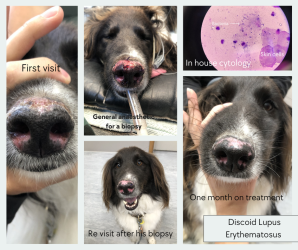
Farewell Sophie
June 14, 2024
It is with great sadness that we are farewelling our wonderful vet Sophie. Sophie has been a much-loved member of our team for the last year and a half and has made special bonds with many of our clients and their pets in that time.
Sophie’s highlights from her time with us have been some of the more complex cases and surgeries she has been involved with, but she has also found it rewarding working more routine care cases as well. She has loved the small-town community feel of Matamata and meeting all the wonderful clients that call it home. Sophie came to MVS Small Animals as a new graduate and has appreciated the support of the entire team in finding her feet in this challenging but exciting profession.
We would like to wish Sophie all the best in her new role, we know she is going to achieve great things.
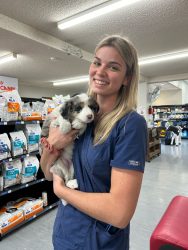
Temporary Closure of Late Nights
June 13, 2024
From the 24th of June, MVS Small Animals will not be running the late-night Thursday clinic (5-7pm) for a couple of months.
We apologize in advance for any inconvenience this may cause. Saturday morning consults will still run as per normal (8.30am – 12.00pm).
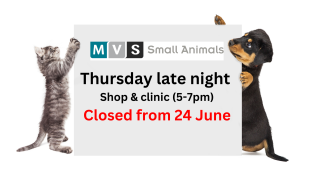
Summer safety for our pets
January 19, 2024
With the arrival of long sunny days, it’s a good time to touch upon some points to help our 4-legged family members stay comfortable and safe this summer.
Unfortunately, we tend to see an increase in heat stroke cases over the summer months. There can be a few contributing factors but the main causes we see are pets being left in vehicles and pets exercising in the heat of the day. Heat stroke can progress very quickly and is, in some cases, fatal.
By following some simple guidelines, we can decrease our pets’ chances of overheating.
- NEVER leave your pet alone in a parked car, even if temperatures feel tolerable to you. Temperatures rise in parked cars incredibly quickly and our pets have minimal abilities to sweat and cool themselves down, resulting in increased panting and subsequently, overheating.
- Exercise pets in the morning or evening when temperatures are cooler and if possible, stick to shaded areas.
- Always provide clean, fresh water both inside and outside and if possible, take water on walks.
- Provide access to as much shade as possible if dogs are outside – trees, kennels, garage, porch etc.
- Provision of a paddling pool. The clam shell pools are great, even for larger dogs that cannot lie in them. Dogs can cool down quickly via cooling their paws so many large dogs also enjoy simply standing in cold water.

Farewell Kylie
January 18, 2024
As of next Friday our wonderful Vet Kylie will be hanging up her scrubs for the last time and leaving us to go on maternity leave.
We know clients and staff alike are going to miss Kylie’s enthusiasm, knowledge, dedication and bubbliness around the clinic but we cannot wait for her to come back and visit us with her little one in the not too distant future.
We wish Kylie, Tom, and the boys all the best for the arrival of their wee baby girl.

Preventative Gastropexy
January 16, 2024

Guy Fawkes and our pets
October 26, 2023
While Guy Fawkes night, and the week leading up to and following, can bring joy to many child and adult alike, unfortunately the same cannot be said for many of our pets.
Every year we speak to concerned pet owners about ways in which we can help our pets through this challenging time and we do have some helpful tips and products at our disposal.
- Keep your pets indoors for the evenings with cat and dog doors closed for the night, or as much of the night as your pet will allow. Pulling all curtains early on so pets cannot see the fireworks can also help.
- Make sure dogs are wearing their collars (with registration tag attached) and all contact details are up to date if pets are microchipped, in case they should escape. If your pets are not microchipped and you are on the fence about it, it is a good time to get in and get it done.
- Putting on the TV or radio early in the evening can help to muffle the noise of the fireworks however don’t have it so loud as to unsettle your pets if they aren’t used to it.
- Providing a covered crate, igloo, cardboard boxes or a safe hiding spot for pets to retreat to can help.
- Providing a new toy or treats as a distraction.
For some pets, the above preparations are not enough to help and that’s where shop products and/or medication can be of assistance.
- Calmex – This is an oral calming supplement that can be purchased in the shop for both cats and dogs. It is safe for long term use and we recommend purchasing and trialing for a couple of days prior to the first lot of fireworks so dose rates can be altered if needed. More information can also be found – https://www.vetplus.co.uk/products/calmex-2/
- Feliway and Adaptil – These are pheromone sprays, infusers and collars that assist in creating a calming, secure environment for your pet. Our nurses are always happy to discuss these in depth to help choose the right product for your animal. More information can also be found – https://www.ceva.com.au/Products/Companion-animals/Behaviour
- Thundershirts – These are tight shirts worn by your pet in periods of stress. They provide gentle, constant pressure to calm all types of anxiety, fear, and over-excitement, much like swaddling a baby. More information can be found – https://thundershirt.co.nz/
- Medication – Our vets are always more than happy to see any pets who struggle through Guy Fawkes each year or those which have a nervous disposition, to see if medication is a suitable option. Please do not hesitate to call the clinic to discuss this option with one of our nurses.

Are your pets vaccinations up to date for the summer holidays?
October 8, 2023
This is just a timely reminder that if you are planning to put your pets into kennels or catteries over the summer holidays, it is a good idea to check their vaccination books now to make sure their vaccinations are up to date. In some instances, if the vaccination has lapsed by more than a few weeks, we may need to give 2 lots of vaccinations 1 month apart. We would hate to see this left too late and potentially interfere with your pet’s ability to go to the kennels or cattery.
Please don’t hesitate to contact us at the clinic if you do not have your vaccination book but need to check your pet’s vaccination status.


